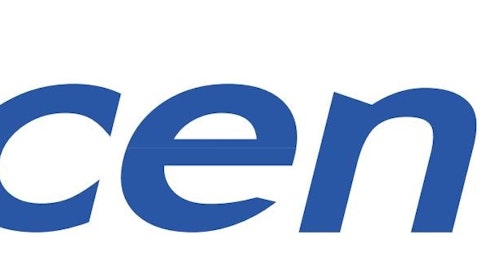One in five people on the planet are a resident of China, and according to the United Nations, by 2030 its population will be over 1.5 billion. Coupled with this explosion comes the inevitable explosion of the internet in China, thanks to Chinese authorities who allow individuals and businesses to have internet accounts. Since then, the Chinese have been captivated by the ‘net, and all of the opportunities it represents. Unsurprisingly, numerous internet companies such as Baidu.com, Inc. (ADR) (NASDAQ:BIDU), China’s premier web search engine; SINA Corp (NASDAQ:SINA), an online media and news company; and Alibaba, an private auction website on the verge of an IPO, emerged at rapid pace several years ago.
Today, Chinese consumers’ insatiable appetite for all things related to the internet, including e-commerce has attracted the attention of investors, and “Chinese internet companies” has been a theme that has captivated nearly anyone interested in enormous profit. Today, Baidu and SINA Corp (NASDAQ:SINA) are highly volatile stocks. But at this juncture, is there any opportunity?
Baidu: Don’t rush in just yet
Due to the gradual-yet-volatile investor disappointment with how the Chinese internet companies have performed since the sector’s peak in early late 2010/early 2011, Baidu.com, Inc. (ADR) (NASDAQ:BIDU)’s P/E ratio has dropped from approximately 100 to 19.7. When the company reported its first quarter of earning this year, margins experienced significant declines, as management announced that aggressive spending on sales and marketing for mobile products and other investments in research and development would hamper margin growth for the rest of the year.
The rate at which overall revenue figures grow has slowed, granted that revenue is still growing quarter-over-quarter. At the end of 2011, the company’s revenues grew 83.2% year-over-year (from $1.3 billion to $2.4 billion). Investors had expected this unabashed growth to continue. At the end of 2012, the company’s revenues had increased from $2.4 billion to $3.6 billion, or 53.8% year-over-year. For any company, these figures are impressive – but in technology, it represented the slowing of the brazen growth the company had experienced over the last several years. Unfortunately, this trend doesn’t look like it’s going to reverse in the next few quarters, so for now, Baidu.com, Inc. (ADR) (NASDAQ:BIDU) should remain on the sidelines as a do-nothing stock.
In addition, Baidu.com, Inc. (ADR) (NASDAQ:BIDU) recently acquired PPS, an online video platform, for $370 million, and plans on merging it with iQiyi, it’s own video platform. The integration process will take time and not be beneficial to expense lines. On a positive note for the Chinese internet companies, this event leads to further potential consolidation of the China internet industry as a whole, as evidenced by the additional M&A activity that has been happening in the space, which means that there’s an opportunity for Baidu, Sina, and Alibaba to become massive global technology giants. However, that time hasn’t quite arrived yet.
Sina: China’s other internet titan
Sina’s recent Q1 earnings report was lackluster/mixed, beating EPS but missing on revenue ($126M, or +19% year-over-year, vs. consensus estimates of $118M). Advertising revenues, which comprise nearly 75% of total revenues, increased by 20% year-over-year to $94.3 million. A primary factor in SINA Corp (NASDAQ:SINA)’s stock price improvement is the revenue accretion of Weibo, the company’s microblogging website (similar to Twitter). Today, according to iResearch, Weibo accounts for 57% of all microblogging in China.
Weibo has the potential to contribute to Sina’s top-line growth significantly with minimal impact on expenses over the next 2-3 quarters, which investors have not adequately priced into their models. Weibo now represents approximately 45% of Sina’s product mix shift, vs. 1% in the first quarter of 2012. This demonstrates that the company is moving away from its low-margin wireless services business. In addition, SINA Corp (NASDAQ:SINA) has recently announced that it has planned to sell an 18% stake in Weibo, its own version of Twitter, to Alibaba at a whopping $586 million. Over the long term, this partnership should be accretive to revenues, given the fact that connecting Alibaba’s large merchant base with Weibo’s large user base will expose additional opportunities for the company to consider expansions into social commerce.
Alibaba
The percentage of Chinese now using the Internet, roughly 40%, is about half of the Internet users in the US. Because this population will undoubtely grow as China appetite to consume online continues to expand, companies such as Alibaba – who integrate ecommerce with the proliferation of the smartphone and the internet – are slated to profit. Although not yet public, as one of the most highly anticipated IPOs since Facebook, Alibaba looks like it could command a valuation upwards of $100 billion (but more likely in the range of $50-70 million). While there hasn’t been a date set yet for the IPO, analysts expect a listing within the next few months — much closer than founder Jack Ma’s 2012 comment of “in the next five years.” In addition, Ma has stepped down as CEO on May 10, the company is currently undergoing a restructuring that, according to Ma, will create 25 new business units for the purposes of taking further advantage of the rapidly developing e-commerce landscape.
It seems fairly obvious that the world’s largest online retailer would attract a great deal of attention from investors. Alibaba’s net profits increased from $236.9 million in December of 2011 to $642.2 million by December of 2012. While these figures are undoubtedly impressive, at this juncture, Baidu.com, Inc. (ADR) (NASDAQ:BIDU) and Sina are China’s two internet giants, and the platform likely won’t be ceded to any large third player at this point in time. However, if you are interested in keeping your finger on the pulse of China growing pace, it is crucial to keep Alibaba in mind, even long after its IPO.
Appetite for volatility
The fact that the allure of Chinese internet stocks seems to have come and gone helps to rationalize the fact that winners ultimately will take all. If you have an appetite for volatility and the patience to keep up with the fast pace of development of these three companies, SINA Corp (NASDAQ:SINA) is the most attractive because of the potential for Weibo to be accretive to top line revenue thanks to China’s insatiable appetite for personal expression on the internet (micro blogging).
However, if you’re truly interested in investing in Chinese internet companies, keep in mind that you will need to have an appetite for volatility as well, given these stocks characteristically display fairly large movements in short periods of time. What makes a great internet company is pure innovation ingenuity. Thus far, Baidu has displayed the most potential to be China’s internet superstar. It just hasn’t demonstrated that it has the chops yet.
Colin Tweel has no position in any stocks mentioned. The Motley Fool recommends Baidu and SINA . The Motley Fool owns shares of Baidu.
The article China’s Netspace: Is the Explosion Over? originally appeared on Fool.com.
Copyright © 1995 – 2013 The Motley Fool, LLC. All rights reserved. The Motley Fool has a disclosure policy.





